| Srl | Item |
| 1 |
ID:
121071
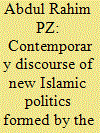

|
|
|
|
|
| Publication |
2013.
|
| Summary/Abstract |
The 2011 popular Arab uprising in West Asia and North Africa has been totally changed the existing perceptions and opinions on the Arabs. Arab uprisings were happened because of the three main deficits. They were economic, political and dignity deficits respectively. Political Islam, Islamist Movements, and new Islamic politics were also discussed rather than before. The political thoughts of classical Islamist Intellectuals like Sayyid Qutub, Hasan al Banna and Abul A'ala Moududi have been modified as per the new Islamic political thoughts of Rashid Al Gannouchi and the practical models of Racep Tayyib Erdogan. Definitions of the Europian secularism and democracy changed.
|
|
|
|
|
|
|
|
|
|
|
|
|
|
|
|
| 2 |
ID:
121060
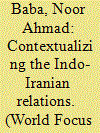

|
|
|
|
|
| Publication |
2013.
|
| Summary/Abstract |
The Islamic revolution in Iran during 1978-79 resulted in bringing about a fundamental change in the Iranian foreign policy orientation that had a positive bearing on the indo-Iranian relationship. To reinforce this relationship the two countries began to discover and emphasize a number of commonalities between the two in history and in contemporary times. In this context while as Pakistan continued to be pro-west and the US partner in anti-Soviet war in Afghanistan, Iran gained greater proximity with India as a member of non- aligned community. In the changed context Iran became weary of the OIC and its activities. This indifference towards OIC and many of its conservatively oriented concerns was reinforced by Iraq-Iran war that polarized the Muslim countries.
|
|
|
|
|
|
|
|
|
|
|
|
|
|
|
|
| 3 |
ID:
121069
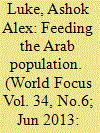

|
|
|
|
|
| Publication |
2013.
|
| Summary/Abstract |
One of the gravest concerns that mankind is facing today is hunger. There are more than 900 million people who go hungry daily around the world and an estimated 25000 people die a day due to hunger and its related causes. Hunger is due to the unavailability of adequate food in sufficient quantities at an affordable price to lead an active and healthy life. Today there is enough food production to feed the global population yet there is a failure in the distribution. Most of the hungry people reside in the developing and the underdeveloped nations.
|
|
|
|
|
|
|
|
|
|
|
|
|
|
|
|
| 4 |
ID:
121059
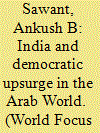

|
|
|
|
|
| Publication |
2013.
|
| Summary/Abstract |
The recent democratic upsurge in the Arab World - starting with Tunisia and passing through Egypt, Libya, and Yemen has already taken the toll of autocratic rulers of these countries. In Syria, a bitter fighting is going on between Assad's troops and opposition forces. The country is almost on the brink of Civil War and at any time the opposition may form their government and ask for international recognition. Almost every Arab country is affected by this upsurge, though many managed to survive for the time being, but the motion is already set in and it will have its impact in due course.
|
|
|
|
|
|
|
|
|
|
|
|
|
|
|
|
| 5 |
ID:
121062


|
|
|
|
|
| Publication |
2013.
|
| Summary/Abstract |
Despite strong reasons to be friends, India and Israel remained estranged for more than forty years. India's West Asia policy to pledge solidarity with the cause of Palestinians and stand by the sentiments of Arab countries has been most instrumental for India's desertion of Israel. However, the relationship between the two countries did not ever reach the lowest ebb as Israel's response was prudent enough to understand India's practical and internal compulsions. Along time India's disillusionment with its Arab neighbours increased and so was changing its attitude towards Israel. The post-90s era brought a major shift in India's West Asia policy. India decided to bury its long-standing differences with Israel.
|
|
|
|
|
|
|
|
|
|
|
|
|
|
|
|
| 6 |
ID:
121070
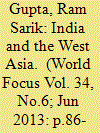

|
|
|
|
|
| Publication |
2013.
|
| Summary/Abstract |
This paper aims to understand the historical prospective of India and West Asia relations in the 21st century. From ancient to modern times, these regions had been in cultural, commercial and diplomatic contacts with each other. British colonialism had changed the nature of the relationship between these two regions. To protect their commercial and strategic interest in India, Britain colonized the West Asian region (Persian Gulf and Red Sea Region) and they established an Informal Empire in Gulf. Further these colonial policies were controlled through the British India Residency System which legitimized the ruler as the sheikh of the land and the people. The End of the nineteenth century and the beginning of twenty century witnessed the emergence of a new phase of interaction between the people and the leadership of India and West Asia. This new phase of relation between two regions had greater impact on shaping the future world politics. With the Arab Spring of recent times, India has a new role to play in this region.
|
|
|
|
|
|
|
|
|
|
|
|
|
|
|
|
| 7 |
ID:
121058


|
|
|
|
|
| Publication |
2013.
|
| Summary/Abstract |
The GCC States are very important for India due to energy security, trade, investments, food security, and Indian workers and for broader security and stability in the region. But from a long term perspective, India should develop close relations with at least three strategically important West Asian states: Oman, Iran and Egypt. This article forcefully argues why India must focus on these States keeping in mind historical, cultural, political, economic and strategic factors.
|
|
|
|
|
|
|
|
|
|
|
|
|
|
|
|
| 8 |
ID:
121063
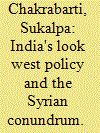

|
|
|
|
|
| Publication |
2013.
|
| Summary/Abstract |
India shares historic ties with the Arab and Islamic world that cut across the spheres of culture, economy and politics. Described variously as our "extended" and "proximate" neighborhood in the diplomatic circles, the region is important for obvious strategic reasons in the fields of energy, trade, business, politics and security. The current upheaval in West Asia naturally has serious implications for India's strategic interests in the region. The unfolding of events bear the ominous possibility of a re-enactment of the Cold War politics with a vicious sectarian twist rooted in religious fundamentalism. Syria has become the current epicenter of a geopolitical showdown in the region with USA and Russia having locked horns, and the UN content to sit on the side-lines. This article would take a close look at the factors affecting and influencing India's role in Syria within the larger context of her West Asian foreign policy. It is recommended that India leads a collective diplomacy of the South to nurture and preserve a forward looking development agenda in West Asia.
|
|
|
|
|
|
|
|
|
|
|
|
|
|
|
|
| 9 |
ID:
121061


|
|
|
|
|
| Publication |
2013.
|
| Summary/Abstract |
The Arab Spring did not turn everything vis-a-vis Gulf politics upside down, but the post-Arab spring politics seems to provide a fundamental component for change in nature of India-GCC relations. Primarily, there are profound shifts in GCC countries' foreign policy making in the post-Arab spring period. The event, of course, has brought a likelihood of a post-American phase in the external policy formulation. This shift is more explicit in Qatar's case as the country is making concerted moves to come closer to the champions of post-Arab spring regional politics-Egypt and Turkey. India and China appear to be the major potential beneficiaries of the emerging situation.
|
|
|
|
|
|
|
|
|
|
|
|
|
|
|
|
| 10 |
ID:
121066
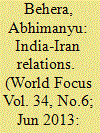

|
|
|
|
|
| Publication |
2013.
|
| Summary/Abstract |
The current ties of India and Iran seems as old as the demise of the Cold War. In the early 1990s Indo-Iranian interests covered on a number of areas, particularly, energy, Central Asia, terrorism germinates from Afghanistan and Pakistan, security and domestic issues. These issues reached at a high level during 2001-03 with Tehran and Delhi declarations, which established a substantial set of framework for enhanced cooperation. Though India's relations with Iran suffered a lot during Indo-US civil nuclear deal and India's opposition to gain Iranian nuclear objective, there was a little indication that the two countries were interested to give up their mutually leverage relationship. However, the present study examines the strategic partnership between India and Iran with recent trends by focusing on the hot issues especially energy security and strategic and defense cooperation and some regional issues and connectivity etc.
|
|
|
|
|
|
|
|
|
|
|
|
|
|
|
|
| 11 |
ID:
121068


|
|
|
|
|
| Publication |
2013.
|
| Summary/Abstract |
The announcement of a will for the re-engagement with Iran on the gas pipeline project by the Indian foreign minister came close on heels with the election of Hassan Rouhani a moderate cleric as the new Iranian President on 15 June 2013. It is widely believed that India can go ahead with the reformist Iranian President Rouhani in developing stronger ties between the two countries, which can open altogether a new chapter in the Indo-Iranian relations and can sail smoothly in their mutual co-operation in serving each other in many issues especially concerning West Asia and Central Asian region. These recent developments are being viewed as a positive sign for the both countries to improve their mutual understanding in diplomatic, socio-political and economic issues.
|
|
|
|
|
|
|
|
|
|
|
|
|
|
|
|
| 12 |
ID:
121067
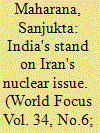

|
|
|
|
|
| Publication |
2013.
|
| Summary/Abstract |
The issue of Iran's nuclear program has been on the top of international agendas during first half of twenty-first century. Iran says that it want and produce nuclear energy for fulfilling its energy needs, the need of electricity as well as medical needs of the country. Iran claimed that as a signatory state of Nuclear Non Proliferation Treaty (NPT) it has the right for the peaceful uses of nuclear energy. But United States of America (USA) termed it as an effort of building nuclear weapons and appeal to the United Nations and other countries to impose restriction on Iran and let the International Atomic Energy Agency (IAEA) for the inspection of Iranian nuclear program. India has been maintaining cooperative relations with Iran and established strategic partnership. On the other hand it has maintained strategic alliance and civil nuclear deal with US. In these circumstances it come to our mind that what type of role India is playing to wards Iran's nuclear issue? This article clearly illustrates the India's position on Iran's nuclear issue.
|
|
|
|
|
|
|
|
|
|
|
|
|
|
|
|
| 13 |
ID:
121065
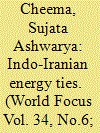

|
|
|
|
|
| Publication |
2013.
|
| Summary/Abstract |
Energy ties form the backbone of the Indo-Iranian relationship, underpinned by the concrete logic of supply and demand: Iran is anxious to sell its abundant hydrocarbon resources and India is an eager buyer. The complementary interests of India and Iran in the energy sector have been recognised by the Tehran and New Delhi Declarations, two substantive sets of agreements that spell out India-Iran cooperation on several issues. While the Tehran Declaration (2001) emphasized mutual benefits that would accrue from enhanced cooperation in the energy area, the New Delhi Declaration (2003) identified energy as a strategic area in the bilateral partnership. Since the Indo-US nuclear deal in 2005, New Delhi has been under intense pressure to align its stand with Washington on Tehran's nuclear programme as well as hold back on energy ties with the Islamic Republic. In fact, in the past few years, the US-led international economic sanctions against Iran have inhibited Indo-Iranian energy ties considerably.
|
|
|
|
|
|
|
|
|
|
|
|
|
|
|
|
| 14 |
ID:
121064


|
|
|
|
|
| Publication |
2013.
|
| Summary/Abstract |
Some US experts now believe that the Iran sanctions have become such an inter-locking maze that it would be difficult to single them out and lift them, if the US and allies seek to incentivise Iranian moves in addressing the nuclear concerns. India, on the other hand, could do well to take away a bit of the sting of these sanctions by taking prudent positions in the United Nations and the other multi-lateral negotiations to the extent its words count. Tehran under Rouhani would have to show the world that its asymmetric military capabilities are only there to cause retribution to deter those who have violence in their minds about the nation.
|
|
|
|
|
|
|
|
|
|
|
|
|
|
|
|